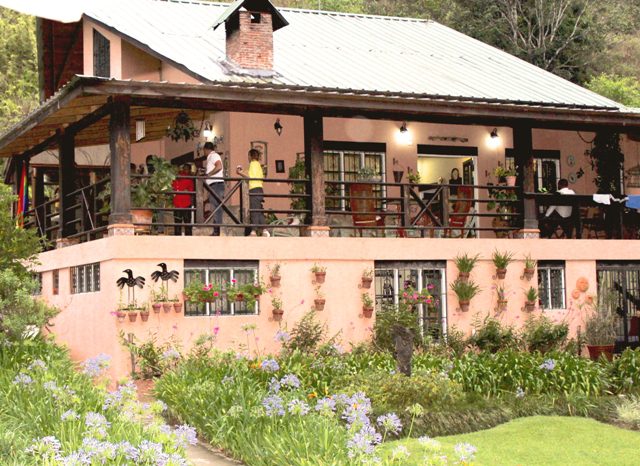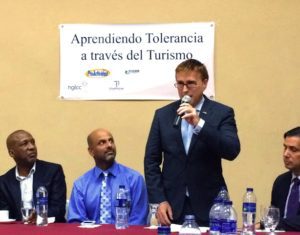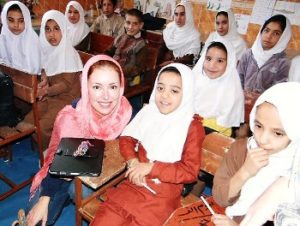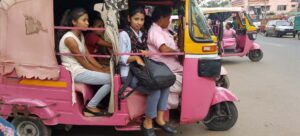
Facebook Comments
A Girl Roamer Discovers That Some Trips Are Complicated, But There Are Tools To Help
By Nicole Clausing
Talk about a buzzkill.
I’m in the middle of a trip to the Dominican Republic. It’s a lesbian, gay, bisexual, transgender, queer and intersex-themed trip, part of a program called Tolerance Through Tourism. The idea is that by simply being an openly gay person and traveling in the developing world, you help people living in traditionally homophobic cultures to see that LGBTQI people are not so strange.
After a few days of this “work,” drinking Barceló rum and walking the charming streets of Santo Domingo’s Colonial Zone without causing any international incidents, I’m starting to feel a little smug. Aren’t I a good person, and isn’t the Dominican Republic coming along nicely, as well?
But then, reality knocks me down a peg. The group I’m traveling with starts hearing troubling reports of civil unrest. Dominican citizens of Haitian descent, we are told, are being forced out of their communities and deported back to Haiti, the country with which the Dominican Republic uneasily shares the island of Hispaniola. If what we’re reading is correct, some of the deported are people whose families have lived in the D.R. for generations and are assimilated to the point of no longer speaking French, the official language of the country to which they’re being repatriated.
This obviously strikes me as a huge injustice and prompts a bout of soul-searching on my part. Can I, with a clean conscience, return home and write articles encouraging American tourists to spend their dollars here? Does the good work the Dominican Republic is doing to challenge the homophobia so rampant in the Caribbean count for anything? And most importantly, how might I have educated myself before my trip, so that I could have made an informed decision about the ethics of this journey?
Positive Signs
To be fair, there is a lot of good going on in the Dominican Republic right now. There is the aforementioned Tolerance Through Tourism project, which is a Caribbean-wide initiative that made its debut in the Dominican Republic. The country was chosen for the rollout because it is perceived as less homophobic than certain other (read: formerly British) islands, and because one of the more prominent gay residents of the West Indies lives here: That would be the former U.S. Ambassador to the Dominican Republic James ”Wally” Brewster, who lives openly with his husband, Bob, in Santo Domingo.

While in the country, I become acquainted with a tangle of excellent programs aimed at improving the lives of Dominicans. At the top of the acronym-heavy list is CVC, the Caribbean Vulnerable Communities Coalition. This international group is based in Jamaica, and is composed of dozens of non-governmental organizations devoted to helping the marginalized of the Caribbean.
One member of that coalition is particularly prominent in the Dominican Republic: COIN, or El Centro de Orientación e Investigación Integral. This group is devoted to providing services to poor and ostracized Dominicans (It’s also a co-founder of Tolerance Through Tourism.) During my trip I fit in a tour of a COIN health clinic in Santo Domingo, and it’s a revelation. An oasis of clean and modern in the old tropical city, the clinic provides low-cost ($1 USD per visit) and in many cases no-cost health care. There is a special emphasis on HIV/AIDS treatment and prevention, but anyone is welcome. Services include physical exams, dental care, and mental health care, including family counseling for households having trouble adjusting to a relative’s coming out as gay or transgender.
Another organization doing great social work in the Dominican Republic is a group called Proactividad. A sub-group of COIN, Proactividad operates country-wide and focuses on providing economic opportunities, especially job training, for low-income Dominicans. I cross paths with them at a Villa La Pasarela, a guesthouse in the less-touristed central part of the country. Proactividad has given a group of young local LGBTQI activists the chance to attend a job-training seminar. After just a few days of intensive introduction to the hospitality industry, the trainees prepare a remarkably good meal for hotel guests. I am moved almost to tears by the earnestness and dedication of these impoverished youth, who are realizing that the door to the tourism industry might be open to them—heady stuff for land-locked kids who previously saw baseball or crushing poverty as their only options in life.
Troubling Developments
But there are also human rights abuses going on in the Dominican Republic that cannot be overlooked. I have arrived in this Caribbean locale during a time of high ethnic tensions. The current crisis stems from a controversial 2014 announcement that native-born Dominicans whose parents lack documentation would be stripped of citizenship and potentially deported unless they registered with the government by June 17, 2015. The deadline for registration was very distressing to the hundreds of thousands of Dominicans whose roots go back to neighboring Haiti.
It is that hotly contentious day that I arrive in the Dominican Republic. By deadline day, only about half of the country’s haitianos have completed the byzantine registration process, leaving about 200,000 technically stateless people in the Dominican Republic. The threatened mass deportations do not materialize during my visit, but there are reports of sporadic forced repatriations across the Haitian border—and of tens of thousands of Dominican-born people of Haitian descent self-deporting. How many Dominicans were uprooted from their homes is impossible to determine, but to me the numbers are not important—the very idea that the government moved to strip a demographic group of citizenship smacks of ethnic cleansing, and is deeply troubling to me.
Know Before You Go
Suddenly the idea of lying in blissful oblivion on the beach feels utterly distasteful. I wonder what I could have done to avoid feeling like I’m fiddling while Rome is burning. Obviously, I should have done a better job of educating myself before I traveled, or, ideally, before I made the decision to travel.
One place I might have started my research is the U.S. Department of State website. The Alerts and Warnings page lists areas of potential unrest in the world. It’s designed with safety more than ethics in mind, but it tracks global conflicts and hot spots, and can alert you to issues that you might have to deal with during your trip.

Another good resource is the Ethical Traveler website. You can register to receive the organization’s newsletter, which is full of information about humanitarian and environmental crises that travelers should be aware of. (On a more positive note, the site also lists an annual top-10 list of what it considers to be the world’s most ethical destinations, based on dedication to human rights, social justice, and care for the environment.
A similar but more activist-oriented organization, San Francisco-based Global Exchange, also offers good information to travelers. They have a newsletter, as well as several blogs and message boards where travelers can exchange information.
In the age of the Internet, tapping the hive mind has never been easier. Lots of Internet forums are made for requesting and sharing information about destinations. Guidebook publisher Lonely Planet has one of the best, known as the Thorn Tree. And of course, there is always your own personal network. Put your questions and concerns out to your Facebook friends, Twitter followers, and such. You never know who might have some helpful insight.
Using Your Travel Dollars Wisely
Maybe you’re still unsure of the ethics of your trip. Maybe it makes a difference to you how much of an impact your travel dollars, whether spent or taken elsewhere, will have on a country’s economy.
If you’re up for a little number crunching, it’s possible to figure this out by visiting the World Bank’s website. Had I been this enterprising, I would have discovered that in 2013 (the most recent year for which figures are available), the Dominican Republic took in just over five billion dollars from tourism. The country’s total gross domestic product that year was just over 60 billion dollars, so tourism accounted for about 6% of the economy of the Dominican Republic.
That’s not a huge number, at least compared to a place like, say, Fiji, where close to a quarter of the GDP comes from tourism—a visitor drop-off there would be devastating. On the flip side, as tempting as it might be to send an economic message to gay-hating, xenophobic, press-stifling Vladimir Putin, only about 1% of the Russian Federation’s economy comes from tourism. You can stay home and boycott, but he will not miss you. Better, perhaps, to go ahead with your trip and show solidarity and encouragement to Russians who don’t have the freedoms we enjoy.
How your money gets distributed is an important consideration, too. You may have every intention of supporting the proletariat on a trip to North Korea, to use an extreme example, but the reality is that most of the money spent there by travelers goes directly to Kim Jong Un’s regime.

How, then, do you maximize the good your money does when you travel? The easiest way is to book a package from a growing number of companies specializing in ethical travel. The Ethical Traveler website connects travelers with group tours that either reward countries doing good—like ecotourism pioneer Costa Rica—or provide a sensitive introduction to places like Cuba, with its fraught human-rights record. The emphasis whenever possible is on patronizing privately owned local businesses where your money goes to the people, not the government. Global Exchange, too, can arrange a socially conscious tour for you, even helping to customize one to your group’s particular interests.
Of course, it’s perfectly possible to book ethical independent travel. You can do it yourself if you’re willing to put in the homework needed to educate yourself. A travel agent can be a big help even if you plan to travel without a group. A good agent will listen to your concerns and help you find hotels and activities that do good for the local population and don’t harm the environment. I may be biased, but I think Girls That Roam Travel (415-517-7239; ) does a great job of this.
Bottom Line
There is no simple formula for calculating the ethics of a vacation. Unraveling moral quandaries is heavily dependent on gut feelings and individual circumstances. There’s no oracle that can tell you whether or not to go—you just have to wrestle with it yourself.
And if in the end the good and bad weigh in as just about equal? I suggest that there is an important thing to consider beyond how your trip might affect the destination. You also have to ask yourself how the destination will affect you. When I think about it, I decide that the Dominican Republic has done a lot of good for me. In just a few days, I’ve learned a lot, about the dignity of gay people living in developing countries; about the messy history of the Americas; and about the myriad fun and surprising things the country has to offer visitors. I’ve even gotten slightly better at Spanish, though the bar was pretty baja to start. I conclude that I’m comfortable with being here, and I’m glad I made the trip.
Maybe you disagree. Maybe you would make a different decision. Maybe I’ll make a different decision next time. I don’t know, and won’t until the situation comes up again and I do my research. But at least now I have some tools to help me do the right thing.
Correction: It was previously edited that James “Wally” Brewester was still the U.S. Ambassador to the Dominican Republic. James resigned as ambassador on January 20, 2017. His husband Bob and he have returned to the United States. This article was revised on April 30, 2017 to reflect the correction.
Book your next getaway to the Dominican Republic with Girls That Roam Travel. Contact Heather Cassell at Girls That Roam Travel at 415-517-7239 or at .
To contract an original article, purchase reprints or become a media partner, contact .







